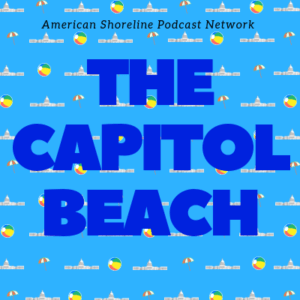 The American Shoreline Podcast Network’s “Capitol Beach” podcast kicked off a five-part series on the 50th anniversary of the federal Coastal Zone Management Act (CZMA) with an episode featuring National Oceanic and Atmospheric Administration (NOAA) Administrator Rick Spinrad and Urban Coast Institute Director Tony MacDonald. The conversation explored Spinrad and MacDonald’s careers in ocean policy, the landmark legislation’s historic impacts, and its staying power in the face of mounting challenges such as climate change, new and competing ocean uses, and America’s growing economic reliance on coastal resources. The podcast is moderated by Coastal States Organization (CSO) Executive Director Derek Brockbank.
The American Shoreline Podcast Network’s “Capitol Beach” podcast kicked off a five-part series on the 50th anniversary of the federal Coastal Zone Management Act (CZMA) with an episode featuring National Oceanic and Atmospheric Administration (NOAA) Administrator Rick Spinrad and Urban Coast Institute Director Tony MacDonald. The conversation explored Spinrad and MacDonald’s careers in ocean policy, the landmark legislation’s historic impacts, and its staying power in the face of mounting challenges such as climate change, new and competing ocean uses, and America’s growing economic reliance on coastal resources. The podcast is moderated by Coastal States Organization (CSO) Executive Director Derek Brockbank.
-
MacDonald Joins NOAA Administrator Spinrad on Podcast to Reflect on 50 Years of CZMA
-
The Urban Coast Institute 2021 Annual Report
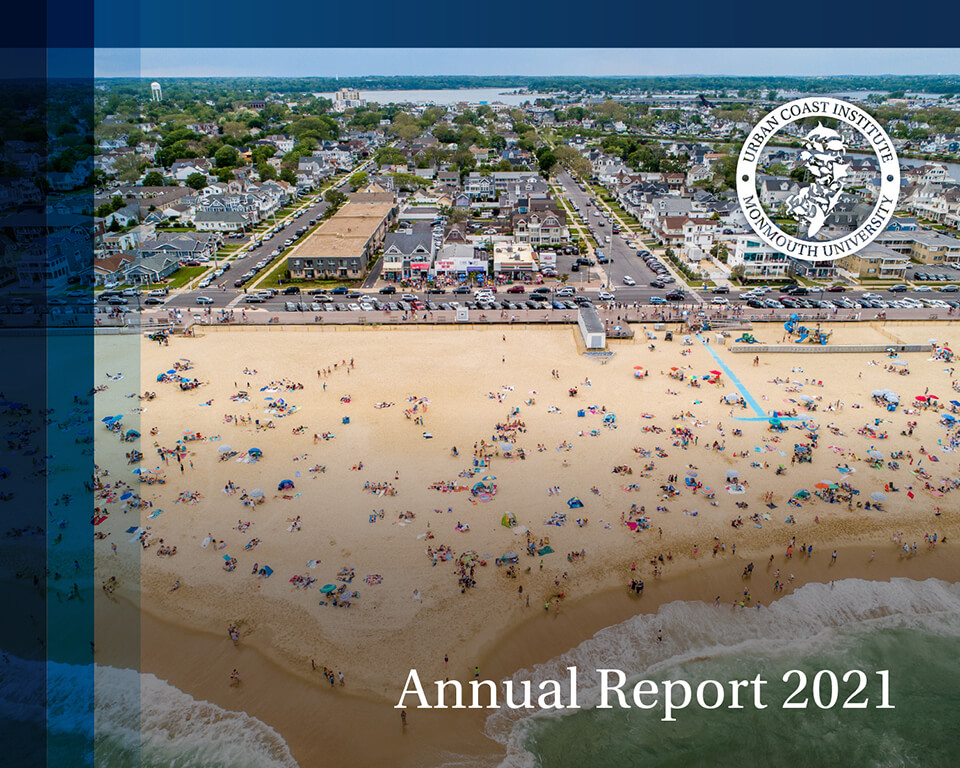
The Monmouth University Urban Coast Institute (UCI) is pleased to present its 2021 Annual Report, which offers a snapshot of accomplishments and collaborations throughout the year including:
- profiles of student scholars and projects;
- work to advance diversity equity, inclusion and ocean justice in the region; and
- participation in climate and coastal resilience efforts locally and around the globe.
Click the buttons below to view the publication as a PDF or digital flipbook. Printed copies of the report are available upon request by emailing uci@monmouth.edu.
-
Watch: ‘Diversity, Equity, Inclusion, and Ocean Justice’ Webinar
The Monmouth University Institute for Global Understanding (IGU) and Urban Coast Institute (UCI) hosted the virtual panel discussion “Diversity, Equity, Inclusion, and Ocean Justice” on March 9. The event was this year’s first installment of the Global Ocean Governance Lecture Series, which assembles international experts to discuss scientific and policy issues that hold important implications for coastal and marine ecosystems. The discussion was moderated by Professor Randall Abate, director of the IGU, and included the following presentations and speakers:
- “From Accounting for, to Accountability to: Reciprocity and Restitution in Collaborative Climate Change Research” by Monica Barra, assistant professor at the University of South Carolina School of the Earth, Ocean & Environment and Department of Anthropology
- “Environmental Justice Impacts of Marine Litter and Plastic Pollution” by Juliano Calil, senior fellow at the Center for the Blue Economy and adjunct professor at the Middlebury Institute of International Studies
- “Preparing the Prospective NOAA-Mission Workforce for a More Just Future” by Sharmini Pitter, assistant director of the National Oceanic and Atmospheric Administration (NOAA) Center for Coastal and Marine Ecosystems
Scroll below to read the speakers’ biographies and presentation abstracts. You can also read a recap of the webinar on the IGU blog.
Speaker Bios & Abstracts
Dr. Monica Barra
 BIOGRAPHY: Monica Patrice Barra, Ph.D., is a cultural anthropologist and assistant professor of race and environment in the School of the Earth, Ocean & Environment and Department of Anthropology at the University of South Carolina. Her research focuses on the ways racial inequalities and geographies are forged in and through scientific knowledge and practices, racial histories, and transformations of coastal environments in the U.S. Gulf South. These topics animate her first book project, “Good Sediment: Race, Science, and the Possibilities of Restoration,” which is an ethnographic examination of the ways Black ecological practices and imaginaires disrupt and re-orient techno-scientific understandings of environmental restoration in the context of coastal Louisiana’s coastal wetland loss crisis. Portions of her research in Louisiana have been published in the Annals of the Association of American Geographers and The Professional Geographer. Her research has been supported by several national grants, including the Wenner Gren Foundation for Anthropological Research, the National Academies of Sciences Gulf Research Program, the Louisiana Endowment for the Humanities, and the National Center for Atmospheric Research. She has collaborated with and presented her work to a variety of environmental groups and organizations, including: NOAA, The National Marine Sanctuaries Foundation, and The Water Institute of the Gulf.
BIOGRAPHY: Monica Patrice Barra, Ph.D., is a cultural anthropologist and assistant professor of race and environment in the School of the Earth, Ocean & Environment and Department of Anthropology at the University of South Carolina. Her research focuses on the ways racial inequalities and geographies are forged in and through scientific knowledge and practices, racial histories, and transformations of coastal environments in the U.S. Gulf South. These topics animate her first book project, “Good Sediment: Race, Science, and the Possibilities of Restoration,” which is an ethnographic examination of the ways Black ecological practices and imaginaires disrupt and re-orient techno-scientific understandings of environmental restoration in the context of coastal Louisiana’s coastal wetland loss crisis. Portions of her research in Louisiana have been published in the Annals of the Association of American Geographers and The Professional Geographer. Her research has been supported by several national grants, including the Wenner Gren Foundation for Anthropological Research, the National Academies of Sciences Gulf Research Program, the Louisiana Endowment for the Humanities, and the National Center for Atmospheric Research. She has collaborated with and presented her work to a variety of environmental groups and organizations, including: NOAA, The National Marine Sanctuaries Foundation, and The Water Institute of the Gulf.ABSTRACT: In a time of global health pandemics, widespread uprisings about racial injustice, and persistent reminders about the catastrophic impacts of climate change, in what ways can climate change science align itself with the aspirations of cultivating social justice? To what extent do the environmental sciences, broadly construed, have an obligation and opportunity to mobilize science in the service of wider calls for confronting social and environmental inequalities? What shifts in research practice and individual/collective mentalities of scientists would such goals require? This presentation examines these questions through the lens of Indigenous and Black thinkers and communities grappling with the acute impacts of climate change. It will draw from examples of community based and collaborative research along the U.S. Gulf coast to consider how matters of reciprocity and restitution — matters of working towards reconciliation and justice — can begin to shift the culture of science to more squarely align with the efforts and needs of historically marginalized communities to achieve forms of racial, economic, and climate justice.
Further reading and resources on this topic.
Dr. Juliano Calil
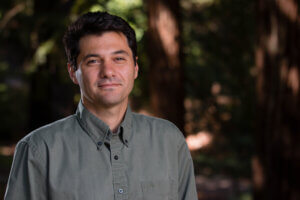 BIOGRAPHY: Juliano Calil, Ph.D., is a senior fellow at the Center for the Blue Economy and adjunct professor at the Middlebury Institute of International Studies. Calil is the co-founder of Virtual Planet Technologies and a pioneer in science communication. His work and academic research are motivated by the urgent need to reduce climate change impacts by adopting equitable solutions through inclusive community engagement. Calil and his team are developing interactive virtual reality experiences to communicate climate change impacts and solutions to diverse audiences. Virtual Planet is working with communities across the country, from Turner Station, MD to Santa Cruz, Long Beach, and Paradise in California, to address complex issues related to coastal flooding, wildfires, and conservation. Calil has published studies related to the use of immersive solutions to address climate impacts and coastal adaptation studies in California, Florida, the Gulf of Mexico, the Mid-Atlantic region, and Latin America and the Caribbean. Recently, he published two studies: “Using Virtual Reality in Sea Level Rise Planning and Community Engagement” and “Neglected: Environmental Justice Impacts of Marine Litter and Plastic Pollution” for the United Nations Environment Programme. Calil received his Ph.D. in ocean sciences from the University of California Santa Cruz in 2017 and his master of environmental science and management from the Bren School at the University of California, Santa Barbara in 2012.
BIOGRAPHY: Juliano Calil, Ph.D., is a senior fellow at the Center for the Blue Economy and adjunct professor at the Middlebury Institute of International Studies. Calil is the co-founder of Virtual Planet Technologies and a pioneer in science communication. His work and academic research are motivated by the urgent need to reduce climate change impacts by adopting equitable solutions through inclusive community engagement. Calil and his team are developing interactive virtual reality experiences to communicate climate change impacts and solutions to diverse audiences. Virtual Planet is working with communities across the country, from Turner Station, MD to Santa Cruz, Long Beach, and Paradise in California, to address complex issues related to coastal flooding, wildfires, and conservation. Calil has published studies related to the use of immersive solutions to address climate impacts and coastal adaptation studies in California, Florida, the Gulf of Mexico, the Mid-Atlantic region, and Latin America and the Caribbean. Recently, he published two studies: “Using Virtual Reality in Sea Level Rise Planning and Community Engagement” and “Neglected: Environmental Justice Impacts of Marine Litter and Plastic Pollution” for the United Nations Environment Programme. Calil received his Ph.D. in ocean sciences from the University of California Santa Cruz in 2017 and his master of environmental science and management from the Bren School at the University of California, Santa Barbara in 2012.ABSTRACT: Plastic pollution is greatly contributing to the global environmental justice crisis. In this session, Dr. Calil, the lead author of “Neglected: Environmental Justice Impacts of Marine Litter and Plastic Pollution” published by UNEP, will share the report’s main findings including the impacts of the COVID-19 pandemic on plastic pollution, a brief outlook of plastic production, how plastic pollution delays the implementation of nearly all Sustainable Development Goals, and finally, some recommendations to reduce future impacts, including some promising policies being discussed in California.
Dr. Sharmini Pitter
 BIOGRAPHY: Sharmini Pitter, Ph.D., is the assistant director of the NOAA Center for Coastal and Marine Ecosystems. Pitter is a graduate of Stanford University’s Department of Environmental Earth System Science in collaboration with the Stanford Archaeology Center. Her transdisciplinary research background includes geochemical studies of the link between changes in the paleoenvironment, cultural technology, and decision-making during the Neolithic period. Pitter utilizes her research background to assist students in preparing for the future, transdisciplinary workforce.
BIOGRAPHY: Sharmini Pitter, Ph.D., is the assistant director of the NOAA Center for Coastal and Marine Ecosystems. Pitter is a graduate of Stanford University’s Department of Environmental Earth System Science in collaboration with the Stanford Archaeology Center. Her transdisciplinary research background includes geochemical studies of the link between changes in the paleoenvironment, cultural technology, and decision-making during the Neolithic period. Pitter utilizes her research background to assist students in preparing for the future, transdisciplinary workforce.ABSTRACT: In this presentation, Pitter will address the role of education and training in developing awareness of and solutions to climate and ocean justice issues for the future. The NOAA Center for Coastal and Marine Ecosystems is a NOAA Cooperative Science Center established through a competitive award funded by the NOAA Educational Partnership Program with Minority Serving Institutions (EPP/MSI). The goal of the NOAA Center for Coastal and Marine Ecosystems (CCME) cooperative agreement is to educate and train a new generation of scientists, particularly from historically underrepresented communities, in NOAA-relevant STEM disciplines and social sciences, equipped to utilize interdisciplinary approaches to address issues confronting marine and coastal communities. This cooperative agreement reflects a 20-year legacy of partnership with Florida A&M University and the NOAA EPP/MSI. In 2021, the NOAA CCME agreement was renewed to continue five additional years of providing opportunities for students to gain skills for entering the competitive future NOAA-mission aligned workforce, with particular emphasis on the NOAA Science and Technology Focus areas including environmental justice and citizen science.
NOAA CCME will host the Tenth Biennial NOAA EPP/MSI Education and Science Forum on April 6-8 in Tallahassee, Florida, at Florida A&M University with opportunities to network with students, faculty, and NOAA and industry researchers. For more information about the Forum and how to attend please visit https://ccme.famu.edu/eppforum2022/.
-
UCI Grants to Support School Green Teams, Sculpture Installation
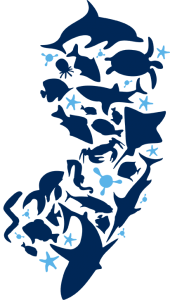 The Urban Coast Institute has awarded two spring Faculty Enrichment Grants for projects that will expand green teams in New Jersey schools and create art inspired by utopian societies that once existed in Jersey Shore communities.
The Urban Coast Institute has awarded two spring Faculty Enrichment Grants for projects that will expand green teams in New Jersey schools and create art inspired by utopian societies that once existed in Jersey Shore communities.The UCI offers these grants on a competitive basis to Monmouth University faculty to support individual or collaborative projects for the enhancement of existing curriculum, new curriculum development, research and scholarship and team-teaching opportunities. Funding is available through the Heidi Lynn Sculthorpe Scholars program for faculty and student researchers of all disciplines whose work advances core elements of Monmouth’s Strategic Plan and supports the UCI’s mission. The following projects were approved for the spring round.
Going Green across the Garden State: Fostering the Formation of Green Teams in New Jersey School Districts
Faculty researchers: Michelle Schpakow, Ed.D., Department of Curriculum and Instruction; School of Education Dean John Henning, Ph.D.; Kyle Seiverd, Ed.D., School of Science
Roughly half of New Jersey school districts have formed green teams comprised of teachers, administrators, students, parents and other community members to promote sustainable practices. This project will determine factors that promote green team development and share these strategies with the larger New Jersey community through a webinar; facilitate the development of new green teams at three New Jersey schools by establishing mentorships with three established green teams; and pilot discussions in focus group sessions that determine how the process of forming green teams affects participants’ perspectives regarding sustainability.
Ruin/Regeneration: A Sculptural Installation

The former North American Phalanx site in Colts Neck. Photo: Historic American Buildings Survey (Library of Congress) Faculty researcher: Susan Meyer, MFA, Department of Art & Design
This grant will support the creation of a sculptural installation inspired by the cyclical states of ruin and regeneration in coastal areas along the New Jersey shoreline. Professor Meyer and student assistants will conduct research on coastal ecosystems in Sandy Hook and utopian societies that once existed in Ocean Grove and at the historic North American Phalanx in Colts Neck to inform the project. The artwork will be publicly exhibited at the Frances Young Tang Teaching Museum and Art Gallery at Skidmore College in Saratoga Springs, New York, through the summer.
Apply Now for Funding
The UCI is currently seeking proposals for student summer research grants, Faculty Enrichment Grants for the summer and fall, and endowed scholarships for the 2022-23 school year. Click here to learn more.
These opportunities have been made possible through the generous support of many private and corporate donors. If you would like to make a tax-deductible gift to the Urban Coast Institute, please visit our online contribution form.
-
Monmouth U. to Monitor Deal, Sunset Lakes as Part of Statewide Probe of Harmful Algal Bloom Causes

The sun sets over Deal Lake in Asbury Park. (Photo by Anthony DePrimo) Monmouth University has received a $127,600 grant from the New Jersey Department of Environmental Protection (NJDEP) to monitor Sunset and Deal lakes as part of a study of factors driving cyanobacterial harmful algal bloom (HAB) formation in New Jersey lakes.
The work will be conducted by Endowed Associate Professor of Marine Science Jason Adolf, Urban Coast Institute (UCI) Community Science Coordinator Erin Conlon and Monmouth students. The team will regularly sample the lakes for water quality indicators such as clarity, temperature, HAB abundance, salinity and pH levels. In addition, periodic samples will be taken to study the range of cyanobacteria species present during bloom and non-bloom periods and the relationship between heavy rain events and HAB abundance.
In lake ecosystems, the phytoplankton responsible for most HAB events are a type of photosynthetic bacteria known as cyanobacteria, or sometimes called “blue-green algae.” The organisms can produce toxins that are hazardous to humans and sometimes lethal to pets and wildlife. The issue has gained increased attention from state officials in recent years, as severe HAB events caused closures in lakes that are summer tourist destinations and drinking water sources.
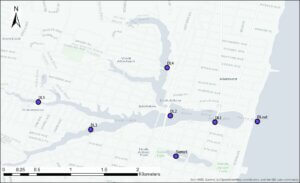
The study sampling sites. Deal and Sunset lakes were selected for inclusion in the statewide study for being representative of the unique conditions of coastal lakes. These water bodies differ from typical inland lakes in that they have ocean connections, which result in higher salinities and the occasional outflow of hazardous microbes at bathing beaches. The team will collect and analyze water samples from Deal Lake at five sites in Allenhurst, Asbury Park and Ocean Township, and from Sunset Lake at one site in Asbury Park.
Deal Lake is the largest coastal lake in New Jersey and has a history of water quality impairments, including HABs. It discharges to the ocean in Asbury Park through a controlled gate as a means to avoid flooding. The team will sample the ocean on days when the gate is open. Sunset Lake flows into Deal Lake through an underground connection.
Among the questions to be explored through the data analyses are:
- Do the sites sampled differ from each other in terms of HAB biomass and/or toxicity?
- Do cyanobacteria and/or cyanotoxins contaminate ocean swimming beaches during bloom periods?
- Does rainfall predict HAB events/expansion in Deal and Sunset lakes?
Additionally, questions pertaining to comparisons between the lakes and others being studied throughout New Jersey will be addressed as directed by the NJDEP.
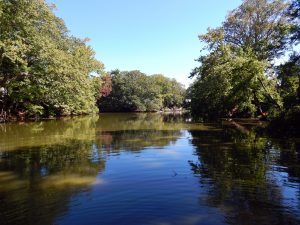
The University has studied and monitored Deal Lake for decades, most recently through its work on the Coastal Lakes Observing Network (CLONet). Since 2019, Adolf, Conlon and University students have trained and equipped community volunteers to collect water samples from 11 Monmouth County coastal lakes and file their findings to an online database. The data collected as part of the NJDEP study will complement the CLONet project’s.
-
Apply Now for UCI Summer Research and Faculty Enrichment Grants, Endowed Scholarships
 The Urban Coast Institute (UCI) is seeking proposals from Monmouth University students and faculty members of all disciplines for grants to support summer research through its Heidi Lynn Sculthorpe Scholars program. Endowed scholarships for the 2022-23 school year are also available for Monmouth students with a demonstrated financial need and interest in coastal, marine, and environmental studies.
The Urban Coast Institute (UCI) is seeking proposals from Monmouth University students and faculty members of all disciplines for grants to support summer research through its Heidi Lynn Sculthorpe Scholars program. Endowed scholarships for the 2022-23 school year are also available for Monmouth students with a demonstrated financial need and interest in coastal, marine, and environmental studies.The deadline for student summer research grants and endowed scholarships is March 21. Proposals for Faculty Enrichment Grants will be accepted through May 20 for the summer and Aug. 12 for the fall semester.
Student Summer Research Grants
Each year, the Heidi Lynn Sculthorpe Scholars program awards dozens of students funding to conduct hands-on research projects that provide real-world experience while helping make a positive impact in coastal communities. Past examples have ranged from marine science research aboard University vessels, to studies on the fairness of beach access regulations, to the creation of artwork and communications products that promote healthy oceans.
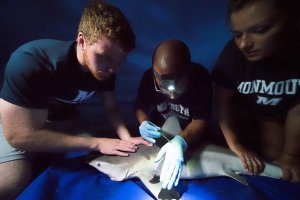 Summer research projects may be proposed by students with the support of a faculty mentor or proposed by a faculty member with the support of students who will work under their supervision. Students will have the opportunity present their work at the Monmouth University School of Science Summer Research Symposium in August.
Summer research projects may be proposed by students with the support of a faculty mentor or proposed by a faculty member with the support of students who will work under their supervision. Students will have the opportunity present their work at the Monmouth University School of Science Summer Research Symposium in August.All proposals relevant to the UCI mission are welcome. Some specific topics of interest include:
- Enhancing consideration for social justice, diversity, equity, and inclusion as coastal communities adjust to a changing climate
- Resiliency of coastal communities and environments
- Impacts of sea level rise on coastal environments and communities
- Environmental and social issues related to offshore wind development
- Coastal ecosystem adaptation planning
- Financing resilience
- Coastal community capacity building to address climate change
For more information and instructions for submitting a proposal, visit the Heidi Lynn Sculthorpe Scholars page on the MyMU Portal (Monmouth sign-in credentials required).
Endowed Scholarships
The UCI has established four scholarship funds to support undergraduate students pursuing degrees including, but not limited to, marine and environmental biology and policy (MEBP) and political science, as well as global sustainability minors, with a demonstrated interested in coastal, marine and environmental studies. They are: the Ann and Alfred L. Ferguson ’13HN UCI Endowed Scholarship; the MacDonald Family UCI Endowed Scholarship; the Rita Mangan UCI Endowed Scholarship; and the Urban Coast Institute Endowed Scholarship.
These scholarships are intended to encourage Monmouth students to become active, global citizens while fostering an understanding of the coastal and marine environment and communities, legal studies, public policy, and research methods. Recipients must be full-time students with demonstrated financial need. Scholarships will be for a minimum of $1,000 with the opportunity for renewal.
Click here (University sign-in credentials required) for more details on criteria and instructions for applying.
Faculty Enrichment Grants
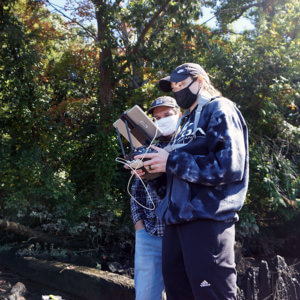 UCI Faculty Enrichment Grants support full-time faculty of any rank for individual or collaborative projects for the enhancement of existing curriculum, new curriculum development, research and scholarship, and team-teaching opportunities. Although all proposals relevant to the goals and objectives of the UCI will be accepted, the UCI is particularly interested in funding collaborative, multidisciplinary projects that address aspects of the climate crisis and advance diversity, equity, inclusion and justice.
UCI Faculty Enrichment Grants support full-time faculty of any rank for individual or collaborative projects for the enhancement of existing curriculum, new curriculum development, research and scholarship, and team-teaching opportunities. Although all proposals relevant to the goals and objectives of the UCI will be accepted, the UCI is particularly interested in funding collaborative, multidisciplinary projects that address aspects of the climate crisis and advance diversity, equity, inclusion and justice.Mini-grants are also available on a rolling basis for conference fees, symposia, guest speaker honoraria, equipment and supplies to supplement or develop course curricula or course-related activities, and other needs to be determined on a case-by-case-basis.
Click here (University sign-in credentials required) for more information and instructions for submitting proposals.
Questions?
Those seeking more information about any of the funding opportunities above may contact UCI Associate Director Tom Herrington at (732) 261-5588 or therring@monmouth.edu. Students or faculty with questions are also welcome to drop in at any time to an open UCI Summer Research Grant Information Session hosted by Herrington on March 4 from 3-4 p.m. The virtual meeting credentials are below.
Zoom link: https://monmouth.zoom.us/j/94407254733?pwd=b3A3aGhBM0ovRGN5ZUF1a2J2d3ZiQT09
Call-in option: (301) 715-8592
Meeting ID: 944 0725 4733
Passcode: 312007
-
Watch: ‘A Tale of Two Seal Hunts: Contesting the Conflation of Canadian Sealing Activities’
The UCI’s Marine and Environmental Speaker Series resumed Jan. 26 with “A Tale of Two Seal Hunts: Contesting the Conflation of Canadian Sealing Activities.” The virtual lecture was delivered by Sarah Levy, a Ph.D. candidate at the University of Oxford (U.K.) Faculty of Law.
The discussion was moderated by Rechnitz Family/UCI Endowed Chair in Marine Environmental Law and Policy Randall Abate, who also serves as director of the Monmouth University Institute for Global Understanding. A Q&A session was held following the presentation.
Abstract
The Canadian commercial seal hunt that occurs annually in Atlantic Canada has attracted international criticism for decades primarily due to animal welfare and wildlife conservation concerns. Although the Atlantic sealing industry is an entirely separate and distinct activity from Inuit sealing occurring in Canada’s Arctic, the two practices are regarded by many as one and the same. The conflation of Inuit and commercial sealing has been a deliberate effort on the part of industry, government, and interest groups that have propagated a misinformation campaign on the subject.
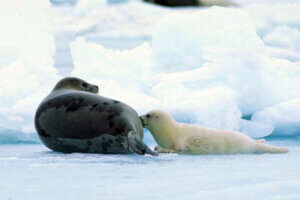 This presentation compares Inuit and commercial hunting activities, highlighting the differences between the purpose, practices, and scale of these hunts. With the distinctions between the two practices made clear, it explores the historic and ongoing ways in which the commercial sealing industry and federal government have perpetuated the conflation of the two. By failing to acknowledge the differences between Inuit and commercial sealing practices, special interest groups have been complicit in perpetuating this conflation as well, although several of these groups have recently worked to clarify the distinction between the two. As a result of the muddied dialogue on commercial and Inuit sealing, both food security and the survival of culture and livelihoods has been compromised in Inuit communities. Despite these ramifications, some Inuit support the commercial hunt because of how anti-sealing campaigns have adversely affected Inuit hunters. At the same time, other Inuit believe that the industry constitutes a wrongful appropriation of their sacred cultural practice, and are seeking to reclaim the practice as their uniquely protected right.
This presentation compares Inuit and commercial hunting activities, highlighting the differences between the purpose, practices, and scale of these hunts. With the distinctions between the two practices made clear, it explores the historic and ongoing ways in which the commercial sealing industry and federal government have perpetuated the conflation of the two. By failing to acknowledge the differences between Inuit and commercial sealing practices, special interest groups have been complicit in perpetuating this conflation as well, although several of these groups have recently worked to clarify the distinction between the two. As a result of the muddied dialogue on commercial and Inuit sealing, both food security and the survival of culture and livelihoods has been compromised in Inuit communities. Despite these ramifications, some Inuit support the commercial hunt because of how anti-sealing campaigns have adversely affected Inuit hunters. At the same time, other Inuit believe that the industry constitutes a wrongful appropriation of their sacred cultural practice, and are seeking to reclaim the practice as their uniquely protected right.This presentation unpacks the distinctions between commercial and Inuit sealing practices, and explores the historic and ongoing implications of their conflation. It concludes that conflating Inuit and commercial sealing has been damaging for the harp seal species and Inuit communities alike.
Speaker Bio
 Sarah Levy is a Ph.D. candidate at the Faculty of Law, University of Oxford, where she is conducting research on the laws surrounding Canadian sealing activities. In her doctoral project, she is exploring the conflation of Inuit sealing practices and the commercial sealing industry, with a focus on the intersections of animal, environmental, and Indigenous rights in this context. Sarah has been called to the Bar of Ontario and held positions at the Ministry of Environment, Conservation and Parks at the Government of Ontario and Animal Justice Canada. She holds a B.A. (Hons) from Trinity College, University of Toronto in Ethics, Society, and Law and Environmental Studies, and a J.D. and Master of Environmental Studies from Osgoode Hall Law School at York University. She completed her master’s research on the topic of direct-action and international marine wildlife conservation laws, in which she explored the ways in which nongovernmental organizations fill the gap between law and enforcement where nation states fail to institutionalize conservation.
Sarah Levy is a Ph.D. candidate at the Faculty of Law, University of Oxford, where she is conducting research on the laws surrounding Canadian sealing activities. In her doctoral project, she is exploring the conflation of Inuit sealing practices and the commercial sealing industry, with a focus on the intersections of animal, environmental, and Indigenous rights in this context. Sarah has been called to the Bar of Ontario and held positions at the Ministry of Environment, Conservation and Parks at the Government of Ontario and Animal Justice Canada. She holds a B.A. (Hons) from Trinity College, University of Toronto in Ethics, Society, and Law and Environmental Studies, and a J.D. and Master of Environmental Studies from Osgoode Hall Law School at York University. She completed her master’s research on the topic of direct-action and international marine wildlife conservation laws, in which she explored the ways in which nongovernmental organizations fill the gap between law and enforcement where nation states fail to institutionalize conservation. -
Student Q&A: Michelle Etienne and Samantha Pawlik on Fairness of N.J.’s Beach Badge Fees, Offshore Wind Impacts on Marine Life
Students in Professor Randall Abate’s Ocean and Coastal Law and Policy class recently delivered final presentations on issues they selected to concentrate on throughout the semester. Among them were Michelle Etienne who focused on whether local beach badge fees were consistent with the public trust doctrine, and Samantha Pawlik, who explored how New Jersey’s offshore wind farms will impact marine life. Learn about their findings in the Q&A and presentation slides below.
Presentation Title: “N.J. Beach Access: Do Beach Badges Violate the Public Trust Doctrine?”
 Student Researcher: Michelle Etienne
Student Researcher: Michelle EtienneYear and Major: Senior, Music Industry
View slides (PDF, 1MB)
What is the public trust doctrine and how does it relate to beach badge fees?
The public trust doctrine is the principle that certain natural and cultural resources are preserved for public use, and that the government owns and must protect and maintain these resources for the public’s use. It originates from Roman law, was established in English Common law, and was adopted in the U.S. in state law. In New Jersey, the public trust doctrine applies to tidal waterways and their shores in the state and establishes that citizens have the right to fully utilize these lands and waters for a variety of public activities that must be protected. These public activities include navigation, commerce, fishing, swimming, bathing, sunbathing, and walking along tidal waterways and their shores. At the beach, the land that reaches the mean high waterline (wet sands) is public trust land managed by the state.
The public trust doctrine in New Jersey requires the state and local governments to ensure adequate access to public trust sites (i.e. the wet sands and open water). There must be adequate linear/lateral access, perpendicular access, and visual access to these public trust lands. This is where beach badges play a role. In order to access the dry private sands, and ultimately the public sands, many New Jersey beaches charge a fee. At each vertical and horizontal access point on the beaches, badge checkers await to make sure that beachgoers have paid a fee to access the beach for the day. The question is whether this practice of charging a fee to access private land and ultimately public land is permissible under the public trust doctrine.
Do you believe charging the public to use the beach violates the spirit of the public trust doctrine? Why or why not?
As a Jersey Shore resident, I am accustomed to having to purchase my seasonal beach badge each summer and the concept of beach badges has never seemed odd to me. However, in researching the PTD and the history of beach badges on the Jersey Shore, I believe that this practice violates the PTD.
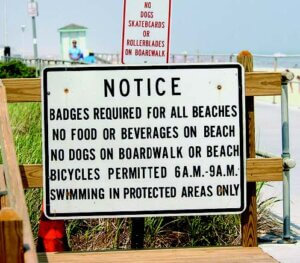 Beach badges were first introduced by the town of Bradley Beach in 1929 for the sole purpose of limiting beach access to only town residents and visitors in town hotels. But it quickly was recognized as a revenue-generating method and many beach towns followed suit. In 1972, in the landmark case of Borough of Neptune v. Avon-by-the-Sea, Avon-by-the-Sea attempted to charge less for badges for town residents and more for out-of-town residents to access its beaches. The court held that municipalities may not discriminate against nonresidents with badge fees. Although this case established that there may not be any discrimination in pricing, badge fees still restrict some people from being able to go to the beach. These fees also have no limit to how much they can be increased each year. In Avon-by-the-Sea alone, daily badge fees went up by $3 in just two years and a regular adult season badge increased by $10. Although these badge fees are the same for everyone, these fees are becoming more expensive, ultimately making it less affordable for some New Jersians to access the beach. This reality undermines the goals of the public trust doctrine and the duty that state and local governments have to ensure adequate access to public trust lands.
Beach badges were first introduced by the town of Bradley Beach in 1929 for the sole purpose of limiting beach access to only town residents and visitors in town hotels. But it quickly was recognized as a revenue-generating method and many beach towns followed suit. In 1972, in the landmark case of Borough of Neptune v. Avon-by-the-Sea, Avon-by-the-Sea attempted to charge less for badges for town residents and more for out-of-town residents to access its beaches. The court held that municipalities may not discriminate against nonresidents with badge fees. Although this case established that there may not be any discrimination in pricing, badge fees still restrict some people from being able to go to the beach. These fees also have no limit to how much they can be increased each year. In Avon-by-the-Sea alone, daily badge fees went up by $3 in just two years and a regular adult season badge increased by $10. Although these badge fees are the same for everyone, these fees are becoming more expensive, ultimately making it less affordable for some New Jersians to access the beach. This reality undermines the goals of the public trust doctrine and the duty that state and local governments have to ensure adequate access to public trust lands.What are some ways that the state or municipalities can better uphold the rights granted in the public trust doctrine?
Many shore towns argue that badge fees are necessary to their town budget. The towns reinvest these revenues to help maintain the beaches for public use. While towns need to have adequate funding for beach maintenance, I have two suggestions that I believe would help towns raise adequate funds for beach maintenance while upholding the rights granted in the PTD.
My first suggestion is for the state to establish a percentage limit on the amount a town can increase its badge fees per season. Towns would need permission from the state to increase fees above these levels. This would ensure that towns aren’t increasing these fees too quickly and that they have legitimate, strong reasoning for these increases that are beneficial to the maintenance of public trust lands. My next suggestion is that all beach towns adopt a “Beach Utility,” which is a committee of town elected officials that dedicates all revenue derived from beach badge sales back into the maintenance of the beach. This would ensure that the money made from badge sales is used exclusively to maintain the private and public beach lands.
Presentation Title: “Implementing Safeguards for New Jersey Offshore Wind Projects to Address Impacts to Marine Life”
 Student Researcher: Samantha Pawlik
Student Researcher: Samantha PawlikYear and Major: Senior, Political Science
View Slides (PDF, 1MB)
Your presentation examined the issue of offshore wind energy off the New Jersey coast. Where does progress on wind development stand in New Jersey today and what are the next steps?
New Jersey is currently approved to start construction of the nation’s largest combined offshore wind farm in 2024. The New Jersey Board of Public Utilities (NJBPU) awarded a combined 2,658 MW of offshore wind capacity to Ørsted’s Ocean Wind II and Shell’s Atlantic Shores Offshore Wind, bringing the state’s total planned capacity to over 3,700 MW. Gov. Phil Murphy signed Executive Order No. 92 in 2020, setting the goal of 7,500 MW of offshore wind by 2035. The federal government, led by the Bureau of Ocean Energy Management (BOEM), is responsible for identifying, leasing, and reviewing offshore wind areas and projects located between three and 200 nautical miles from the U.S. coast. BOEM will review and approve the construction and operation phases for the two projects, which includes environmental and technical reviews as well as design and implementation plans.
You discussed some of the risks that offshore wind projects pose to marine life, and cetaceans in particular. Can you describe what you found?
Although there is limited research on this topic, I was able to find enough information to conclude that offshore wind farms do have a significant impact on marine wildlife and their habitat. Excessive noise can affect marine wildlife behavior, particularly those species that are more sensitive to sound, that rely on their use of vocalization for communication, and those that use echolocation for navigation, such as cetaceans. Preconstruction activities of offshore wind farms include use of geosurveys that use high-energy acoustic sources to transmit sound, which creates an image of the seafloor. Construction requires a variety of sound-generating activities, including seismic exploration, excavation with explosives, dredging, ship and/or barge operations, and pile driving. Even during the operations phase of wind turbines, researchers have found that the slight vibrations that travel through the poles cause sound radiation through the seafloor. These activities all result in disturbances to marine habitat and can cause negative impacts to marine wildlife behavior and health.
What are some of the ways those risks could be mitigated on the technology and policy sides?
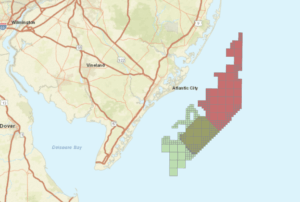 Mitigating these risks through technology and policy reforms is key to implementing such a large-scale project in a safe manner. Cutting-edge technology has been a crucial component in the construction of offshore wind farms. My project discussed suction bucket and gravity-based foundations, which are new technologies that can be used in place of monopile foundations as a quieter and less disruptive alternative during construction. Collaboration between agencies to provide efficient documentation of progress and findings, transparency of information with shore towns and public education on the projects, and continued research efforts are all key to attenuate the threats posed by offshore wind farms. Duke University recently received a $7.5 million grant from the U.S. Department of Energy (DOE) to assess the risks that offshore wind energy development along the East Coast may pose to birds, bats, and marine mammals. This type of research will help inform decisions and identify steps that can be taken to reduce harmful impacts on marine wildlife as offshore wind deployment increases.
Mitigating these risks through technology and policy reforms is key to implementing such a large-scale project in a safe manner. Cutting-edge technology has been a crucial component in the construction of offshore wind farms. My project discussed suction bucket and gravity-based foundations, which are new technologies that can be used in place of monopile foundations as a quieter and less disruptive alternative during construction. Collaboration between agencies to provide efficient documentation of progress and findings, transparency of information with shore towns and public education on the projects, and continued research efforts are all key to attenuate the threats posed by offshore wind farms. Duke University recently received a $7.5 million grant from the U.S. Department of Energy (DOE) to assess the risks that offshore wind energy development along the East Coast may pose to birds, bats, and marine mammals. This type of research will help inform decisions and identify steps that can be taken to reduce harmful impacts on marine wildlife as offshore wind deployment increases. -
Watch: Tribute to President’s Medal Honoree Robert Sculthorpe
Congratulations to Robert Sculthorpe ’63, ’15HN, on receiving the inaugural President’s Medal in recognition of his extraordinary service, philanthropy, and leadership. The award, created by President Patrick Leahy, represents the highest honor Monmouth University can bestow on an individual.
The video includes commentary by Director Tony MacDonald on Sculthorpe’s many contributions to the Urban Coast Institute. The UCI’s student research grant program and Monmouth University’s largest research vessel, the Heidi Lynn Sculthorpe, are named in memory of his daughter and in honor of his support.
-
MacDonald Joins the Citizen Campaign’s Law and Policy Task Force
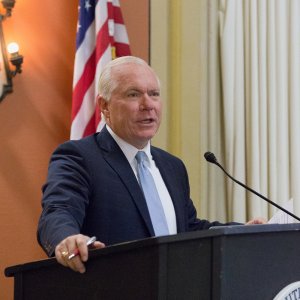 Urban Coast Institute Director Tony MacDonald has been named a member of the Law and Policy Task Force for the Metuchen, New Jersey-based Citizens Campaign. Founded in 1997 by government law and policy expert Harry Pozycki, the mission of the Citizens Campaign is to educate all Americans to the fullness of their political power and to introduce them to the shared experience of public service performed by participating in “No-Blame Problem Solving” of public issues.
Urban Coast Institute Director Tony MacDonald has been named a member of the Law and Policy Task Force for the Metuchen, New Jersey-based Citizens Campaign. Founded in 1997 by government law and policy expert Harry Pozycki, the mission of the Citizens Campaign is to educate all Americans to the fullness of their political power and to introduce them to the shared experience of public service performed by participating in “No-Blame Problem Solving” of public issues.The nonprofit organization consists of a community of practical problem solvers made up of volunteer government law and policy experts, civic leaders, civic-minded business people, high school and college students, teachers, veterans, and service-driven church members, dedicated to empowering fellow Americans through citizen leadership training and exposure to community-based public service options that offer citizens the opportunity to exercise leadership without having to run for public office. For more information about the organization and how you can get involved, visit thecitizenscampaign.org.
